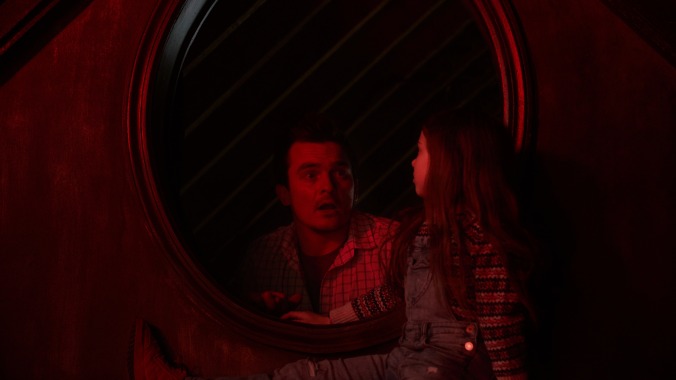Separation plasters a lousy custody drama with the wallpaper of a crappy horror movie

Note: The writer of this review watched Separation on a digital screener from home. Before making the decision to see it—or any other film—in a movie theater, please consider the health risks involved. Here’s an interview on the matter with scientific experts.
Every divorce drama plays a little like a horror movie. The bloodshed may be chiefly emotional, but it’s still plenty bloodcurdling—at least for those less chilled by the roar of a chainsaw than the thought of a whole life you’ve built with another person slowly unraveling. Separation, which arrives in gradually reopening theaters this weekend, puts a literally supernatural spin on the horror of a shattered union and an ugly custody battle. That’s not a terrible idea in theory. But this bargain-basement thriller approaches both its jack-in-the-box scares and its domestic scenario with the negligence of an unfit parent; it will spook neither the superstitious nor the matrimonially anxious.
Many of the best films about imploding marriages divide the audience’s sympathies, acknowledging fault on both sides. In Separation, there’s no question that washed-up comic-book artist Jeff (Rupert Friend) is an imperfect father and husband, failing to secure steady employment and falling short of keeping a vigilant eye on his button-cute daughter, Jenny (Violet McGraw, whose ghost-heavy resume is starting to rival that of professional haunted kids Joey King and Lulu Wilson). But Jeff’s screw-ups seem minor compared to the legal hell unleashed by his ex-wife, high-powered businesswoman Maggie (Mamie Gummer), who not only seeks sole custody of their daughter but also wants to completely cut Jeff out of her life. These scenes play like the ad campaign of one of those attorneys that loudly specializes in fathers’ rights, realizing a paranoid nightmare of vindictiveness.
Fortunately for Jeff, his heartless spouse ends up splattered on the pavement, astoundingly killed in a hit-and-run just as she’s confessing the true height of her cruelty (“She’s mine,” she hisses of their daughter right before impact) during a fraught phone call. Unfortunately for Jeff, even death can’t quell Maggie’s resentment, as he discovers when a malevolent apparition starts gusting around the family home, trying to make good on that lingering threat of taking his daughter away from him. As horror, Separation is inept and lazy. Its director, William Brent Bell, who made the infamously awful found-footage exorcism movie The Devil Inside (plus the marginally more accomplished The Boy and its sequel), bungles the sub-James Wan funhouse material. The film peaks early, with an opening credits sequence featuring sketches of fearsome creatures much more intimidating than the marionette-like woman in black who keeps emerging from shadows and doorways. Why introduce Jeff’s roster of creepy illustrated creations, only to leave them on the bench?
The story, by screenwriters Nick Amadeus and Josh Braun, is paced like an endless first act. There’s no escalation, just a zombie shuffle through genre conventions, like the expository advice of a paranormal expert, here taking the ridiculous form of a graphic novelist who suggests downing ayahuasca to make contact with the deceased. As ineffectual as the ghostly set pieces are, they’re preferable to any scene where characters are just talking. Pity the flailing actors, including Brian Cox, clinging almost touchingly to his dignity as the bastard father-in-law. (“You have 72 hours!” he yells at poor Jeff, as though he were a hostage taker issuing demands.) Meanwhile, Madeline Brewer is all heart eyes as the babysitter, a woman whose smitten (and unhinged) loyalty to our feckless leading man is just the flip side of Gummer’s spitefulness. Both are trapped on an unflattering continuum running from fangirl to betrayer.
So what fear is being exorcised here? Separation depicts divorce and custody dispute as a one-sided ordeal; Jeff never learns anything about himself or becomes a better father, he just endures the injustice of a pitiless family trying to rip him away from his child. That may be true to someone’s experience, but it’s deathly dull as drama, even with a shade of Blumhouse splashed on top. The film’s lone value may be setting up the perfect answer to that “improve a movie with one letter” challenge: Add an indefinite article to the front of its title, and you’re left with one of the great films of the new millennium—and, incidentally, a much more unnerving portrait of a marriage on the rocks.